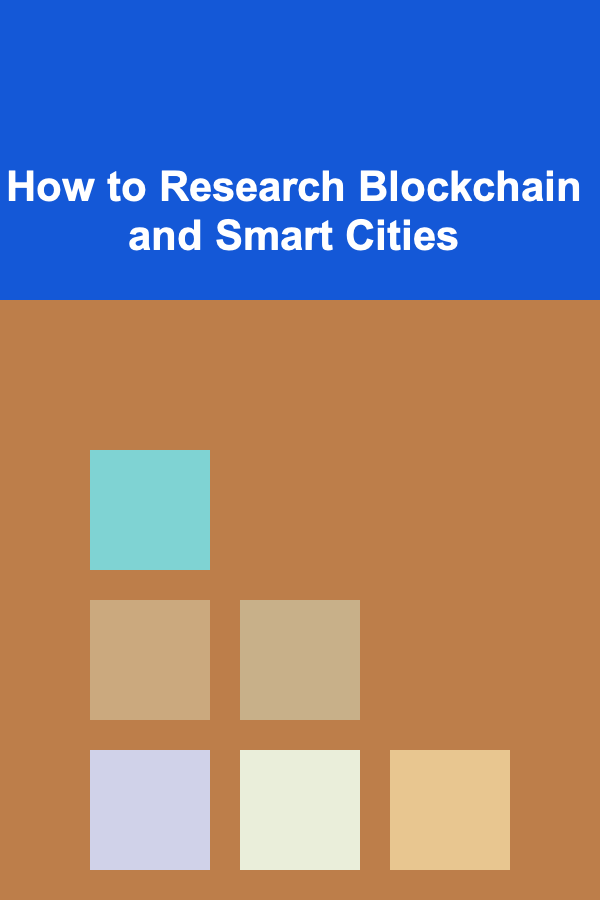
How to Research Blockchain and Smart Cities
ebook include PDF & Audio bundle (Micro Guide)
$12.99$8.99
Limited Time Offer! Order within the next:

Blockchain technology and smart cities are two of the most transformative concepts in modern technological development. Each of these fields is disrupting traditional systems and has the potential to reshape the way we live, work, and interact with each other. As blockchain moves from being a niche technology primarily used for cryptocurrencies to a versatile tool for a wide range of applications, smart cities are emerging as interconnected ecosystems where technology is used to optimize urban living, governance, and sustainability.
If you are interested in researching how blockchain can be applied in the context of smart cities, it's important to approach the task systematically. This article provides a deep dive into the process of researching blockchain and smart cities, highlighting the methodologies, key resources, and essential considerations for conducting meaningful and impactful research in these areas.
Understanding the Core Concepts
Blockchain Technology
At its core, blockchain is a decentralized digital ledger that records transactions across many computers in such a way that the registered transactions cannot be altered retroactively. Blockchain is often associated with cryptocurrencies like Bitcoin and Ethereum, but its potential applications extend far beyond digital currencies.
Blockchain is a distributed and immutable ledger that enables trustless transactions between parties without the need for an intermediary. This can be particularly valuable in systems that require secure, transparent, and tamper-proof record-keeping.
Key characteristics of blockchain include:
- Decentralization: No central authority controls the blockchain; it is managed by a network of nodes.
- Immutability: Once data is added to a blockchain, it cannot be altered or deleted.
- Transparency: Transactions are recorded on a public ledger that anyone can verify.
- Security: Cryptographic techniques ensure that the data on the blockchain is secure.
Smart Cities
Smart cities leverage digital technologies to improve the quality of life for citizens, enhance the efficiency of urban operations, and reduce resource consumption. These cities use a variety of technologies, including the Internet of Things (IoT), big data, and artificial intelligence (AI), to manage public services and infrastructure in real-time.
The key goals of smart cities are to:
- Improve urban mobility: Smart transportation systems, optimized traffic management, and sustainable mobility options.
- Enhance energy efficiency: Smart grids, renewable energy sources, and optimized use of energy resources.
- Boost public safety: Surveillance systems, emergency response optimization, and crime prevention technologies.
- Increase citizen engagement: Platforms for citizen feedback, community-driven initiatives, and digital access to public services.
Why Blockchain and Smart Cities are a Powerful Combination
As cities move toward becoming smarter, the need for secure, decentralized, and transparent systems grows. This is where blockchain can play a crucial role. The intersection of blockchain technology and smart cities can lead to solutions that ensure the security, efficiency, and sustainability of urban environments. Here are a few ways blockchain can be integrated into smart cities:
- Smart Contracts: Blockchain's smart contracts can automate and enforce agreements between different entities, such as governments, service providers, and citizens. This is particularly useful in areas such as public service delivery, land registration, and procurement.
- Secure Data Sharing: Blockchain can provide a secure and transparent way to share data between different entities in a smart city, ensuring that sensitive data such as health information, traffic patterns, and personal details are protected.
- Identity and Authentication: Blockchain can be used for digital identity management, ensuring that citizens can authenticate themselves for accessing public services, voting, and other civic activities without compromising their privacy.
- Energy Management: Blockchain can enable decentralized energy grids where citizens can trade energy (for example, through solar panels) in a secure and transparent manner.
- Supply Chain Management: Blockchain can ensure the transparency and efficiency of supply chains for essential resources like water, food, and medical supplies, especially during times of crisis.
Researching Blockchain and Smart Cities
1. Define Your Research Objectives
Before diving into your research, it's essential to clearly define what you want to investigate. Blockchain and smart cities are vast fields, so it's crucial to narrow down your focus. Some potential research questions include:
- How can blockchain improve data privacy and security in smart cities?
- What are the challenges of implementing blockchain for smart city governance?
- How can blockchain be used for sustainable urban mobility solutions in smart cities?
- What role does blockchain play in the management of energy grids in smart cities?
Clearly defining your research question or objective will help you narrow your search for relevant literature and resources and will provide focus throughout your research process.
2. Conduct a Literature Review
Once you've defined your research question, start by conducting a comprehensive literature review to understand the existing body of knowledge. Given the rapid advancements in both blockchain technology and the concept of smart cities, it's important to review academic journals, conference papers, and industry reports to gather relevant insights.
Resources for a Literature Review:
- Academic Databases: Use academic search engines like Google Scholar, JSTOR, or IEEE Xplore to find peer-reviewed papers and articles on blockchain and smart cities.
- White Papers: Industry reports, white papers, and technical documents from leading blockchain and smart city technology providers can provide valuable insights into real-world applications.
- Books: Several books cover blockchain's potential in smart cities, providing both theoretical foundations and practical examples of blockchain-based solutions.
- Conference Proceedings: Keep track of relevant conferences and events such as the Blockchain Expo and Smart City Expo World Congress, where researchers and practitioners share their latest findings.
By reviewing existing literature, you will identify gaps in knowledge, common challenges, and areas that require further investigation.
3. Investigate Case Studies and Real-World Applications
Blockchain applications in smart cities are still in the experimental phase in many places. However, there are already numerous pilot projects and case studies that provide valuable lessons on how blockchain can be used to address urban challenges. Researching these case studies will allow you to understand the practical applications of blockchain in a smart city context.
Some notable case studies include:
- The City of Dubai: Dubai is at the forefront of integrating blockchain into its governance and smart city initiatives. The Dubai Blockchain Strategy aims to make Dubai the first blockchain-powered government by 2020, streamlining services such as land registration and licensing.
- City of Toronto -- Sidewalk Labs: Sidewalk Labs, a subsidiary of Alphabet (Google's parent company), has proposed a smart city project in Toronto that integrates blockchain technology for various functions, including identity verification, data privacy, and urban governance.
- Blockchain for Smart Grids: Several countries, including Estonia and Switzerland, are exploring the use of blockchain to manage decentralized energy grids. This system allows consumers to trade energy through blockchain platforms in a secure, transparent, and efficient manner.
Investigating these real-world applications will help you understand how blockchain is being used today and how it can be expanded in the future.
4. Technical Research and Understanding Blockchain Protocols
As blockchain is a highly technical field, having a solid understanding of the underlying protocols is essential for any research. Understanding the differences between various blockchain types, such as:
- Public Blockchains: Blockchains that are open to anyone to join and participate in (e.g., Bitcoin, Ethereum).
- Private Blockchains: Blockchains that are restricted to a specific group or organization.
- Consortium Blockchains: Blockchains that are governed by a group of organizations.
- Sidechains: Independent blockchains that are attached to a main blockchain.
These distinctions are important when researching how blockchain can be applied to smart cities, as different types of blockchains may be suited for different use cases, such as public service records, data sharing, or supply chain management.
5. Engage with Experts in the Field
To deepen your understanding and refine your research, it's essential to engage with experts in both blockchain technology and urban planning or smart city development. Experts can provide insights based on their practical experiences and may highlight challenges or opportunities that are not immediately obvious in the literature.
You can engage with experts through:
- Interviews: Reach out to professionals working in the blockchain or smart city fields and arrange interviews to gain firsthand knowledge.
- Online Communities: Join online forums and communities like Reddit's blockchain subreddit or LinkedIn groups dedicated to smart cities and blockchain technology.
- Conferences and Webinars: Attend relevant events and webinars to hear from thought leaders in the industry and ask questions about the latest research trends.
Engaging with experts allows you to stay up-to-date on the latest developments and refine your research methodology.
6. Analyze Policy and Regulatory Considerations
The implementation of blockchain in smart cities is not just a technical challenge; it also involves navigating the complex landscape of policy and regulation. Researching the regulatory frameworks for blockchain in various jurisdictions is essential for understanding the potential barriers and enablers of adopting this technology in urban environments.
Consider investigating:
- Data Privacy Laws: How do existing data privacy laws, such as GDPR in the European Union, affect the use of blockchain for data sharing in smart cities?
- Smart City Governance: What policies are needed to integrate blockchain into smart city governance, and how can local governments incentivize the adoption of blockchain solutions?
- Cryptocurrency Regulation: How do existing cryptocurrency regulations influence blockchain adoption for public services, especially in terms of financial transactions and smart contracts?
Regulatory considerations are critical when researching blockchain applications, as they often dictate the feasibility and scalability of blockchain-based solutions.
7. Develop a Research Framework
Once you have gathered relevant literature, case studies, technical knowledge, and expert insights, it's time to develop a research framework. This framework should outline your methodology for addressing your research questions, including the data collection and analysis techniques you will use.
Possible research methods for studying blockchain in smart cities include:
- Case Study Analysis: Conduct an in-depth analysis of existing smart cities or blockchain applications to identify key challenges and opportunities.
- Surveys and Interviews: Use qualitative research methods to collect insights from experts, city officials, or residents on their experiences with blockchain-powered smart city initiatives.
- Comparative Analysis: Compare the effectiveness of different blockchain-based solutions across cities or regions to identify best practices and areas for improvement.
Conclusion
Researching the intersection of blockchain technology and smart cities presents both exciting opportunities and challenges. By following a structured research approach---defining clear objectives, reviewing literature, exploring case studies, engaging with experts, and understanding regulatory frameworks---you can contribute to advancing knowledge in this rapidly evolving field.
Ultimately, the integration of blockchain in smart cities has the potential to revolutionize urban life, from governance and data management to sustainable resource distribution. As you conduct your research, always remember to consider the broader societal, economic, and environmental implications of these technologies and their potential to shape the cities of tomorrow.
Reading More From Our Other Websites
- [Home Soundproofing 101] How to Soundproof Noisy Pipes and Reduce Water Noise in Your Home
- [Trail Running Tip 101] From Pavement to Paths: Embracing a New Beginning Through Trail Running
- [Home Security 101] How to Prepare Your Home for an Out-of-Town Trip: Security Measures You Shouldn't Skip
- [Personal Financial Planning 101] How to Budget for Major Life Events like Weddings and Children
- [Personal Care Tips 101] How to Choose a Concealer for Dry Skin to Avoid Flakiness
- [Personal Care Tips 101] How to Implement Daily Hydration for Enhanced Personal Care
- [Home Space Saving 101] How to Maximize Your Bathroom Storage
- [Organization Tip 101] How to Incorporate Vintage Furniture into Modern Spaces
- [Organization Tip 101] Why Organizing Craft Supplies Boosts Creativity and Fun
- [Paragliding Tip 101] Best Eco‑Friendly Paragliding Gear Brands Committed to Sustainable Materials

How to Enhance Curb Appeal for Your Rental Property
Read More
How to Troubleshoot Common Dishwasher Problems
Read More
How to Use Pendant Lighting to Add Style to Your Space
Read More
How to Deal with Bears and Other Large Animals
Read More
10 Tips for Low-Maintenance Landscaping: A To-Do List for Busy Homeowners
Read More
10 Tips for Buying Antique Clocks Online
Read MoreOther Products

How to Enhance Curb Appeal for Your Rental Property
Read More
How to Troubleshoot Common Dishwasher Problems
Read More
How to Use Pendant Lighting to Add Style to Your Space
Read More
How to Deal with Bears and Other Large Animals
Read More
10 Tips for Low-Maintenance Landscaping: A To-Do List for Busy Homeowners
Read More